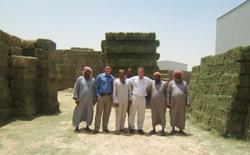In a country whose economy is largely dependent on oil exports, the ethanol industry (and related co-products) is often maligned and a large target of contention and discomfort within Saudi Arabia. However, the proverb “the stone age didn’t end from a lack of stones” exemplifies the evolution of energy technology, and in 2011, Saudi Arabia was overtaken by Venezuela as the owner of the world’s most known oil reserves. All of this confirmed the notion for what most Saudis were already thinking — the necessity to diversify their economy — and one of the new focuses is agriculture. As proof, Saudi Arabia is home to the largest dairy integrations in the world. All of this translates to a large demand pull for feed ingredients.
While the U.S. Grains Council has worked with the Saudis for decades, a recent Council effort to expand market access in Saudi Arabia passed a unique challenge, introducing a brand new product derived from a prohibited industry — alcohol production. This was met with much trepidation. Nevertheless, the Council persevered and was successful in getting distiller’s dried grains with solubles (DDGS) on the much coveted “feed ingredient subsidy list.” The feed ingredient subsidy list is a document that provides financial support for importers to bring in foreign feed ingredients as a method of reducing water consumption. It encompasses everything from soymeal to faba beans. Values are dependent upon energy content and protein levels.
This is a remarkable accomplishment when you take into consideration all of the obstacles that needed to be addressed. However, this is just a new chapter in the Council’s aggressive marketing campaign focusing on stimulating demand and improving market access. Now that we have a starting point, the Council can leverage that success and translate it into DDGS purchases by introducing programming aimed at educating traders and nutritionists about the tremendous benefits of DDGS. We’re already seeing success, as Saudi Arabia has imported 16,000 tons as a response to Council programs. The Council anticipates the demand potential could be tremendous.


